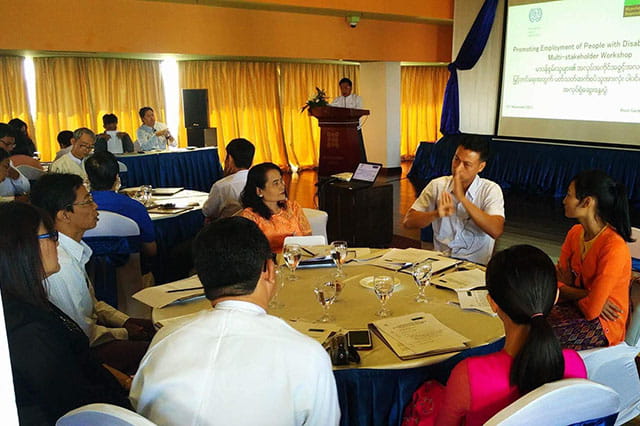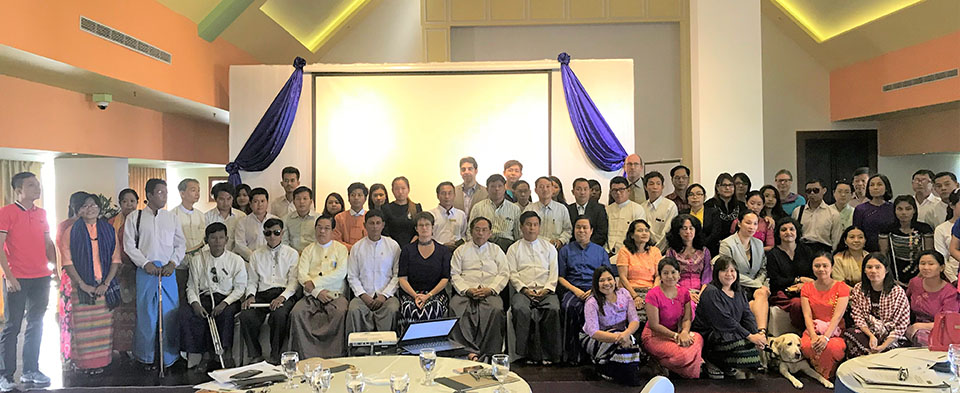Multi-Stakeholder Workshop on Promoting Employment Opportunities for People with Disabilities

Myanmar Centre for Responsible Business (MCRB) and the International Labour Organization (ILO), co-hosted a multi-stakeholder workshop on Promoting Employment Opportunities for People with Disabilities (PWDs) on 21 November, 2017 at Rose Garden Hotel, Yangon (see agenda in sidebar).

Over 100 participants attended from government, business, and civil society groups working for the rights of people with disabilities, as well as international experts. A press release for the workshop is available in English and Burmese (see sidebar).
In his welcoming remarks, Rory Mungoven, ILO Liaison Officer, noted Myanmar’s commitment to promoting and protecting the rights of people with disabilities through its ratification of the Convention on the Rights of Persons with Disability in 2011, and adoption of the 2015 Myanmar Law, which included important provisions on employment opportunities for persons with disability.
He also highlighted that disability is woven into the Sustainable Development Goals, in particular Goal 8 on creating decent work opportunities and access to the labour market for persons with disability, and Goal 10 which emphasises the social, economic and political inclusion of persons with disability. He explained that a special focus on disability in their future work on job creation and social protection in the ILO’s new four year Decent Work Country Program, and that today’s workshop was an opportunity to learn lessons from other countries about how best to achieve the equality for persons with disability in Myanmar referred to by State Counsellor Daw Aung San Suu Kyi in November 2016. He hoped in particular that the work of the ILO’s Global Business and Disability Network could assist with this. The Network brings together disabled people’s organisations and employers organisations and international companies, some of whom are present in Myanmar.
On behalf of the government, U Kyaw Kyaw Tun, Deputy Director of Factories and General Labour Law Inspection Department from Ministry of Labour, Immigration and Population (MOLIP) in his speech emphasized that discussions on creating job opportunities for PWDs were continuing following the adoption of the 2015 Law. He encouraged businesses to treat PWDs equally to other workers, and to provide information to Labour Offices on vacancies and the numbers of PWDs employed. He added one of the main objectives of this workshop was to discuss the introduction of a quota system and how it, and any accompanying financial levy, could best be managed.
U Aung Ko Myint, Chairman of the Myanmar Federation of People with Disabilities presented the historical context for establishing a legal framework for employing PWD which had started in 1958 in the Ne Win era with a focus on disabled war veterans. He noted that the ‘social welfare’ concept of disability was starting to be replaced by the concept of rights, and welcomed the present of the Labour Ministry at today’s workshop.
Daw Soe Moe Oo from Myanmar Federation of Persons with Disabilities presented on the legal framework, the initiatives of MFPD’s Employment Committee such as support for job applications and interviews, and contacts between the Federation and several local companies including KBZ, OK$ Call centre and Lu-Pyan-Taw Padamya, including for free awareness—raising sessions about disability for company employees.
The first panel of the workshop, moderated by John Honney, brought together international experts on business and disability, several of whom have disabilities. They focussed their remarks on the global experience of compulsory employment quotas for people with disabilities, and what this experience could offer Myanmar as it made choices about the quota system.
Michael Jeewa, Joint Chief Executive, Asian People's Disability Alliance (APDA) UK spoke about his experiences as a Myanmar-born member of the UK disability movement, working to promote independent living, changed mindsets and social barriers, and to tackle negative media images, and how this had been supported by a Disability Rights Commission and anti-discrimination laws. Ethnic minorities with disabilities, such as those represented by APDA in the UK could suffer double discrimination. Quotas had been introduced in the UK, but then phased out as they had outlived their usefulness.
Cassandra Chiu, Director of The Safe Harbour Counselling Centre, Singapore and Young Global Leader of the World Economic Forum (whose participation was sponsored by Parami Energy) spoke about how experience of travelling through Asia with a visual impairment, and her observations on the use of quotas in the region. She noted that Taiwan has a comprehensive system of quotas and excellent public transport infrastructure for PWD. However only 12.5% of PWD participate in the labour market, and companies simply pay the levy or pay PWD to stay at home. Singapore has similar rates of labour market participation (12.35%) but no quotas. Instead, government encourages business to employ PWD through incentives to lower the cost. In Malaysia, quotas exist but there is only 1 to 2% labour market participation. PWD are rarely seen in public, and there is a strong focus on charity rather than independent living. Australia, with no quotas, has a 53.4% labour market participation rate; in Japan, with a quota of 1.8-2%, the labour participation rate of PWDs is lower than Australia but still high at 40.3%. This is supported by inclusive attitudes, and excellent infrastructure such as audible traffic lights and pavement bumps. Cassandra concluded that the most important factor in achieving high rates of participation like Japan and Australia is not policies and law, but society wanting this to happen. Myanmar should build that social will and encourage enthusiasm for PWD employment on the part of business, and investment in upskilling and accessibility.
Stefan Tromel, Senior Disability Specialist from the ILO Geneva office spoke about global experiences, and noted that quotas could sometimes be a trigger for placing on the agenda the issue of mainstream employment of PWD in the public and private sectors. Otherwise, there was a risk of assuming PWDs should settle for self-employment. He noted that some companies had shifted from a response to a compulsory quota to a proactive approach to employing significant numbers of PWD. Several of these were included in the ILO’s Global Network. The problem with quotas was that they tended to encourage a focus on numbers employed in low level jobs, rather than quality jobs with career progression, and on dis-ability rather than ability. Governments and disabled peoples organisations in different countries have different views on whether they work. There are between 50 and 60 countries with compulsory quotas. Thus, the UN Convention is silent on whether quotas are recommended, and the ILO does not take a view but can advise on system design which has to be positive and win-win for it to be successful. Levies, rather than sanctions or fines, are more effective, and a quota system has to be underpinned by a functioning disability certification system. Where quotas are introduced, it is essential that they include the public sector. In Spain, a 2% quota in the private sector and 5% in the public sector had encouraged employers to employ PWD in the face of generally high unemployment. Just as the disability movement requires ‘Nothing about us, without us’, so the private sector should be included in the design of a quota system if it is to work. Otherwise their view of disability will be negative.
Stefan Tromel noted that the business case for employing PWDs includes lower absenteeism, better safety record and high retention rates which in turn support the investment in training. Successful employment of PWD, with or without quota, requires a holistic approach. Business needs to actively recruit PWD and ensure the relevant accommodations/adjustments in the working environment. Government should provide underpinning education and infrastructure, and in some cases support for assistive technology. There needs to be sufficient support available such as job coaching from disability service providers/DPOs, and awareness-raising and combatting stereotypes by all.
Dr Sanjukta Choudhury Kaul, International Business School BINUS University International, Indonesia spoke of her research on business and disability in Asia, including India. Definitions of disability in India were being adapted to include more forms of invisible disability such as diseases of the blood, and learning difficulties, well as acid attack victims. Higher education access for PWD was essential. In India, the quota for students was 7%, leading to significant increases in PWD accessing higher education. Business was playing a strong role in supporting scholarships for PWD. While there was a 3% quota for PWD in the Indian public sector, most jobs were at the low/unskilled C and D levels which reinforced stereotypes that PWD could only undertake menial jobs. Business as an economic entity should be encouraged to view PWD as a resource, rather than a compulsory quota, and would value that resource if it has the right skillsets and performs. It was important not to forget disability in rural areas, and also to ensure that certain types of disability such as visual or intellectual impairment, were not left behind, compared to locomotor disability and the hearing impaired.
In breakout discussions, participants identified the challenges and potential solutions for promoting employment of PWD, and specific challenges and solutions relating to the introduction of a quota system.
In two final panel sessions, organisations supporting people with different types of disability spoke about the strategies they were employing to promote independent living, training, including in computer skills, and job skills and internships, all of which are essential to scale up if a quota system is to be successful, but which are also equally valuable as a means to support employment of PWDs even without quotas.
Panellists included Daw Yamin Ohnmar (Myanmar National Association for the Blind), U Nay Tun (Myanmar Autism Association) and U Kyaw Kyaw (Myanmar Deaf Community Development Association). U Nay Lin Soe (Myanmar Independent Living Initiative) spoke about the ‘disability audits’ which they were conducting for companies and U Myat Thu Winn (Shwe Min Tha Foundation) spoke about their Supported Employment Program and Job Coach Coalition Myanmar (JCCM).
Two company speakers, Daw Ma Ma Naing, Human Resources Director at Sule Shangrila Hotel, and U Sett Hlaing, Legal and Compliance DIrector at KBZ Group of companies including KBZ Bank presented on their employment to date of PWDs and collaboration with local disability organisations, and steps they were taking to make their businesses more disability inclusive including for customers. The issue of banking services for PWD as an essential enabler for independent living was raised. Sett Hlaing noted that KBZ Bank was expanding rapidly, and rolling out training for all staff on disability inclusion was lagging behind, leading to inconsistent approaches by branches to hearing impaired and other PWD customers seeking to open accounts.
The multi-stakeholder workshop was preceded by a day’s training on 20 November on disability inclusiveness strategies for senior human resources and other managers from around 20 companies organised by MCRB and led by Dr. Sanjukta Choudhury Kaul, with inputs from Cassandra Chiu.
MCRB is also collaborating with AAR Japan on a draft handbook for business on Employing People with Disabilities which draws on some of the issues and recommendations made at the workshops. Comments are welcome.
Read also
- Video on Disability from I Am Me
- Handbook for Employers on Employing Persons with Disabilities in Myanmar
- MCRB Promotes the Third Networking Event by MSMEs Led/Involved by Persons With Disabilities
- Bringing Assistive Technologies for B2C Services to Myanmar
- Discussing ‘Dignity By Design’ in Myanmar’s Built Environment
 English
English မြန်မာ
မြန်မာ မြန်မာ (unicode)
မြန်မာ (unicode)














